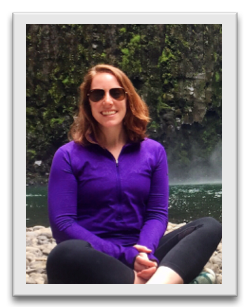 Elizabeth King
Elizabeth King
Postdoctoral fellow
University of British Columbia
I am a postdoctoral research fellow at the University of British Columbia working with Dr. Dominique Weis. I received my B.S. in Marine Science from Boston University in 2012 and my Ph.D. from Oregon State University in 2017. My thesis examined the mechanisms that fractionate molybdenum (Mo) isotopes during low-temperature biogeochemical cycling in order to constrain the utility of Mo as a paleoredox proxy. Following my position with MAGNET, I will be starting a position at Woods Hole Oceanographic Institution as a postdoctoral scholar research trace element behavior in subterranean estuaries.
I was given the opportunity to work on a number of research projects during my tenure as a MAGNET postdoctoral fellow. One of my research interests is focused on optimizing the analysis of iron isotopes using a multi-collector inductively coupled plasma mass spectrometer (MC-ICP-MS). Iron is an abundant element within the Earth’s crust and the accurate measurement of the isotopic composition of various reservoirs can elucidate geochemical processes in both high- and low- temperature geochemistry. However, interferences during sample uptake severely limit the applicability of the iron isotope system. For this research, I collaborated with Nu Instruments to 1) to confirm a baseline for the self-induced matrix effect by using clean standard solutions; 2) to investigate and quantify the effect of additional elements from geological materials on the ratio offset caused by concentration mismatching. Ultimately, these data will be used to design an appropriate matrix-based correction for ratio offsets caused by mismatched concentrations.
I am also studying the fate of molybdenum in an anoxic fjord off the coast of Vancouver Island. Elemental and isotopic Mo cycling in anoxic settings are not well understood and need to be constrained in order to use Mo as a redox tracer. This research determines whether Mo cycling can be described by two fractionation mechanisms found in purely oxic or euxinic environments by investigating interactions with organic matter and changes to Mo speciation that may generate ‘non-conservative’ Mo behavior prior to deposition in anoxic sediments.
The MAGNET program provided me with exciting opportunities in research, mentoring, and networking. I am especially grateful for having the opportunity to organize the MAGNET Grand Finale Workshop on the Big Island of Hawaii, where I was able to network with students and fellow researchers and learn from my peers about a suite of geochemical interests.
Last updated May 2018


 Catherine Armstrong
Catherine Armstrong Laura Bilenker
Laura Bilenker Priyanka Chandan
Priyanka Chandan Carol Cheyne
Carol Cheyne June Cho
June Cho Sarina Cotroneo
Sarina Cotroneo Jamie Cutts
Jamie Cutts Fiona D'Arcy
Fiona D'Arcy Ashley Davidson
Ashley Davidson Nicolas Estrade
Nicolas Estrade Anaïs Fourny
Anaïs Fourny Evelyn Frères
Evelyn Frères Elizabeth King
Elizabeth King Alexander Lemieux
Alexander Lemieux Miling Li
Miling Li Marc-Antoine Longpré
Marc-Antoine Longpré Gregor Lucic
Gregor Lucic Kalina Malowany
Kalina Malowany Eduardo Mansur
Eduardo Mansur Jill McDermott
Jill McDermott Rhy McMillan
Rhy McMillan Aleksandra Mloszewska
Aleksandra Mloszewska Nichole Moerhuis
Nichole Moerhuis Emily Mullen
Emily Mullen Genna Patton
Genna Patton Jean-David Pelletier
Jean-David Pelletier Elizabeth Phillips
Elizabeth Phillips Nabila Rahman
Nabila Rahman Lindsay Reynolds
Lindsay Reynolds Luiz Felipe Salim Amaral
Luiz Felipe Salim Amaral Cheyenne Sica
Cheyenne Sica Elliott Skierszkan
Elliott Skierszkan Kate Smith
Kate Smith Natalie Szponar
Natalie Szponar Victoria Tweedie
Victoria Tweedie Tom Ver Hoeve
Tom Ver Hoeve Clara Waelkens
Clara Waelkens Nicole Williamson
Nicole Williamson Anne Wozney
Anne Wozney Wang Zheng
Wang Zheng


 Site by Sprout Creative
Site by Sprout Creative